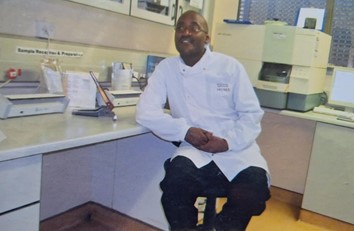
Mungai Ndung’u is the FHI 360 Emerging Infectious Diseases and Health Security (EIDHS) Associate Director for Laboratory Diagnostics and leads our East and Southern Africa Regional (ESARO) activities including for global projects like our USAID funded Infectious Disease Detection and Surveillance (IDDS) project. He is also the Project Director for an innovative program that integrates environmental surveillance of wastewater for the detection of antimicrobial resistant pathogens for our CDC-funded project, Global Antimicrobial Resistance Laboratory Response Network (GARLRN). He also supports Kenya based diagnostics and surveillance activities for our CDC funded Enhancing Global Health Security project. He is best known on the team, though, for his friendly smile and sage demeanor that colleagues near and far have come to appreciate.
What brought Mungai to FHI 360? Why laboratory diagnostics? Well, it all started when he hopped on a bus with a one-way ticket from Nairobi to Gaborone…
It was 2004, when then President Mwai Kibaki of the Republic of Kenya issued an inspirational speech to the people of his country. In it, he gave permission for his countrymen to go out and seize overseas opportunities for learning and professional growth, as long as they came back to Kenya one day to give back to the local economy.
For Mungai, this speech sparked action within him. At the time, he had been at his first job where for the last three years he had successfully helped set up a laboratory at the hospital-based Nairobi Outpatient Center. He was young and energetic, and thinking about next steps for his career. After hearing President Kibaki’s valediction, he decided he would go to Botswana. He, like many others in the region, had heard that the country had just started offering free anti-retrovial treatment for HIV through PEPFAR program support, and needed more skilled laboratory workers to help scale up HIV testing.
Upon arrival, Mungai registered himself with the local professional council and obtained a job at the National Health Laboratory (NHL). This laboratory happened to be part of a research partnership with Harvard University, also known as the Botswana-Harvard AIDS Institute Partnership (commonly referred to as BHP). Little did he know he would be sharing the (wet) bench with many future African leaders in diagnostics, including Dr. Sukhilile Moyo, the scientist renown for identifying the Omicron variant of COVID-19. Mungai was performing serology for the NHL on samples collected from patients presenting to government health facilities, while Moyo and his colleagues were supporting testing activities for various research studies.
“He had a hunger and level of dedication that was unparalleled, often going [beyond] the call of duty during the high-volume testing times in the laboratory. Mungai always believed there is much more to know and learn from everyone, and this humbling posture and collaborative spirit has always defined him,” says Dr. Moyo.
After a few years, Mungai considered furthering his education. He enrolled at a South Africa-based university where he obtained a degree in quality management. During his studies and work in Botswana, he returned home to Kenya periodically for the Christmas holidays and saw that the economy was growing. He remembered President Kibaki’s imperative and after completion of his studies, returned to Kenya in 2011 where his old friend Moyo connected him to a US foundation supporting quality management work.
While working at the U.S. registered foundation, he saw a position for a Laboratory Specialist posted at FHI 360 to support the HIV Clinical Research Support Services (CRSS) project and applied and received the role. He joined the then newly formed Laboratory Sciences Division led by Director, Janet Robinson, as a Laboratory Specialist and now a decade later is the Country Representative for Kenya on a 100+ member team of the Emerging Infectious Diseases and Health Security Division.
For Mungai, the field of diagnostics will never get old. In fact, strengthening national laboratory systems is an exciting and dynamic field, and strong diagnostics networks are crucial now more than ever for the prevention, detection, and response to the latest emerging infectious diseases. Mungai and our team of laboratory diagnostics and surveillance professionals at FHI 360 are working on innovative strategies such as supporting national laboratory programs with diagnostic network optimization and assessments (DNO/DNA), laboratory spatial analysis (LSA) for optimized testing services, strengthening genomic surveillance programs, improving specimen referral and supply chain systems, and integrating One Health approaches with wastewater surveillance activities to enhance early detection of communicable diseases.
Mungai and other EIDHS team members recently presented abstracts and oral presentations on this work at the 7th annual Africa Society for Laboratory Medicines (ASLM) conference held in Cape Town last December. At ASLM, FHI 360 EIDHS also partnered with the Clinton Health Access Initiative, Inc. (CHAI) to lead a side seminar on the future direction of genomic surveillance, the branch of diagnostics that examines the genetic make-up of disease-causing agents to help detect, monitor, and control them.
Conferences are always a great opportunity for meeting globally based colleagues face to face, both old and new. At ASLM, Mungai had the opportunity to catch up with another colleague from his BHP days, Trevor Peter, who was the BHP laboratory director when Mungai arrived in Botswana. Trevor is now the Senior Director for Global Diagnostics Team at the Clinton Health Access Initiative (CHAI) and was a co-organizer of the genomics seminar. He along with Mungai and our other FHI 360 and CHAI colleagues are collaborating on furthering the conversation about genomic surveillance expansion in Africa.
Mungai’s pearl of wisdom: It is always important to build and maintain good relations, seek guidance from mentors or career leaders.
When Mungai is not in the office or laboratory, you will find him spending time at home or out and about relaxing and having fun with his two children, Ndung’u and Njeri, and his wife, Ann. He enjoys traveling, playing and watching football (soccer), and watching documentaries including reality tv.
